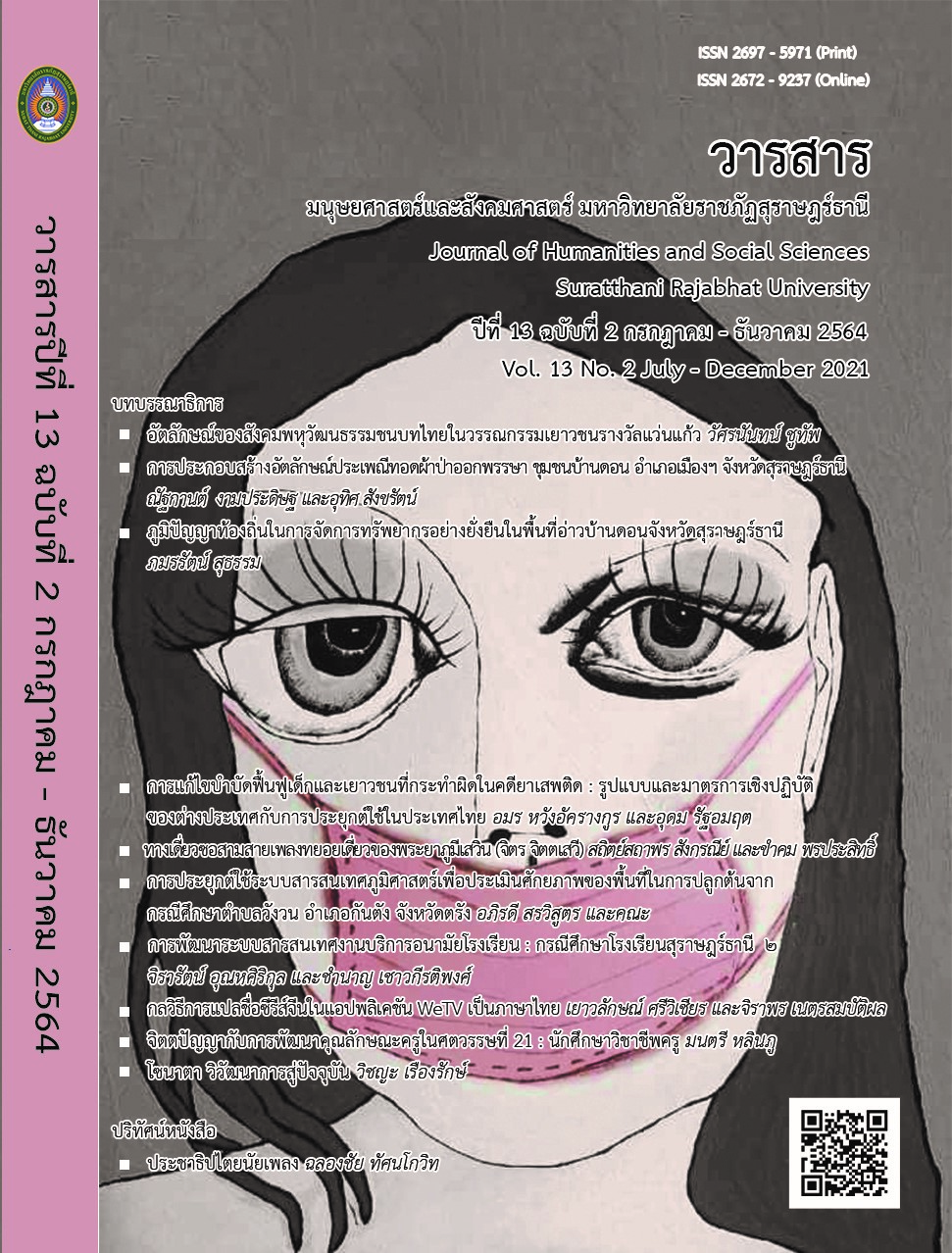Sonata Development to the Present
Main Article Content
Abstract
Sonata is a word that has more than one definition which changes according to what context it is. In some contexts, a sonata is a type of musical composition. However, under a different context it could refer to its form. Both definitions have gone hand in hand from the latter parts of the Baroque period until today’s present time. It is necessary to have the knowledge and proper understanding of various compositional techniques of a composer and their piece and a proper understanding of the sonata form itself. Therefore, the proper understanding of the structure of the sonata form is an element that greatly affects musical performances and compositions. The study of sonata form within this article includes knowledge and information from various forms of publications written by Thai and international experts. This article also includes the study of pieces composed by Thai and International composers. All this to obtain different points of view. For that reason, the study of the sonata form and its development since the end of the Baroque period until today is very important to strengthen one understanding of a piece, the understanding of the sonata form, and to properly classify and distinguish the sonata form from other forms in
music. Additionally, this will also affect how we perform a piece or how we compose a piece when we really understand the essence of the sonata form.
Article Details

This work is licensed under a Creative Commons Attribution-NonCommercial-NoDerivatives 4.0 International License.
All published manuscripts have been verified by peer-peer professors in the fields of humanities and social sciences. Reprinting of the article must be authorized by the editorial staff.
References
ณรงค์ฤทธิ์ ธรรมบุตร. (2552). การประพันธ์เพลงร่วมสมัย. กรุงเทพฯ: สำนักพิมพ์แห่ง
จุฬาลงกรณ์มหาวิทยาลัย.
ณัชชา พันธุ์เจริญ. (2553). สังคีตลักษณ์และการวิเคราะห์ (พิมพ์ครั้งที่ 5). กรุงเทพฯ: เกศกะรัต.
สำนักงานบัณฑิตยสภา. (2561). พจนานุกรมศัพท์ดนตรีศากล ฉบับบัณฑิตยสภา. กรุงเทพฯ:
สำนักงานบัณฑิตยสภา.
อานุภาพ คำมา. (2558). ลาเวนเดอร์แห่งความสงบ. โครงการวิจัย/สถาบันวิจัย. ปทุมธานี:
มหาวิทยาลัยรังสิต.
Cannon, S. C. (2016). Sonata Form in the Nineteenth-Century Symphony.
Empirical Musicology Review. 11(2), 204-224. [Online]. Retrieved
from https://emusicology.org/article/view/4956 [2020, October 05].
Darcy, J. H. (2006). Elements of Sonata Theory: Norms, Types, and Deformations
in the Late-Eighteenth-Century Sonata. New York: Oxford University
Press.
Falterman, D. (2019). Two-dimensional sonata form as methodology: understanding
sonatavariation hybrids through a two-dimensional lens. Thesis of Master
Of Art, Denton: University Of North Texas.
Hybrid Pedagogy Publishing. (2020, August 24). Sonata form – the recapitulation.
[Online]. Retrieved from Openmusictheory: http://openmusictheory.
com/sonataRecap.html [2020, October 05].
Joyce, G. P. (2012). A Graduate Trombone Recital: Selected Solo Trombone
Works of Contemporary American Composer. Thesis
of Master of Art, Indiana: Indiana University of Pennsylvania.
Kang, Y. (2011). Sonata form in the romantic american violin sonata: clara
kathleen rogers and amy beach. Doctoral Document, Doctor of
Musical Arts. Houston: University of Houston.
Lo, P.-R. (2008). Sonata form from scarlatti to prokofiev. Doctoral Thesis,
Doctor of Musical Arts. College Park: University of Maryland.
Rosen, C. (1988). Sonata Form (Revised Edition). New York: W. W. Norton &
Company.
Thakar, M. (1987). The transcendent musical experience: As perm itted by
the structural harmonic activity of sonata form development
section. Doctoral Thesis, Doctor of musical arts in orchestral
conducting. Cincinnati: University of Cincinnati.
Webster, J. (1995). Sonata form. In S. Sadie, The New Grove Dictionary of
Music and Musicians (pp. 497-508). London: Macmillan Publishers
Limited.
William, N. S. (1995). Sonata. In S. Sadie, The New Grove Dictionary of Music
and Musicians (pp. 479-496). London: Macmillan Publishers
Limited.
Youkstetter, F. (1943). The development of the Sonata - form through the
piano works of Haydn and Mozart. Thesis of Master of Art,
L.A.: University of Southern Califonia.


